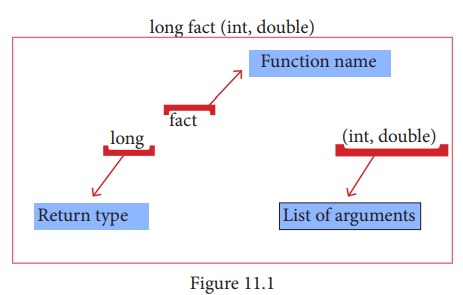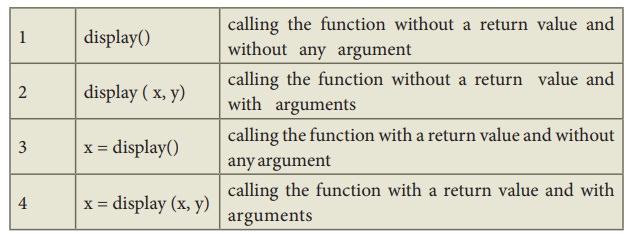C++ | Computer Science - User-defined Functions | 11th Computer Science : Chapter 11 : Functions
Chapter: 11th Computer Science : Chapter 11 : Functions
User-defined Functions
User-defined
Functions
Introduction
We
can also define new functions to perform a specific task. These are called as
user-defined functions. User-defined functions are created by the user. A
function can optionally define input parameters that enable callers to pass
arguments into the function. A function can also optionally return a value as
output. Functions are useful for encapsulating common operations in a single
reusable block, ideally with a name that clearly describes what the function
does.
Function Definition
In
C++, a function must be defined before it is used anywhere in the program. The
general syntax of a function definition is:
Return_Data_Type
Function_name(parameter list)
{
Body of the function
}
Note:
1.
The Return_Data_Type is any valid data type of C++.
2.
The Function_name is a user-defined identifier.
3.
The parameter list, which is optional, is a list of parameters, i.e. a list of
variables preceded by data types and separated by commas.
4.
The body of the function comprises C++ statements that are required to perform
the intended task of this function.
Function Prototype
C++
program can contain any number of functions. But, it must always have only one main() function to begin the program execution. We can write the
definitions of functions in any
order as we wish. We can define the main() function first and all other
functions after that or we can define all the needed functions prior to main().
Like a variable declaration, a function must be declared before it is used in
the program. The declaration statement may be given outside the main()
function.

The prototype above provides the following information to the compiler:
•
The return value of the function is of type long.
• fact is the name of the function.
•
the function is called with two arguments:
The
first argument is of int data type.
The second argument is of double data type.
int display(int , int) // function prototype//
The
above function prototype provides details about the return data type, name of
the function and a list of formal parameters or arguments.
Use of void command
void
type has two important purposes:
•
To indicate the function does not return a value
•
To declare a generic pointer.
void data type indicates the compiler that the function does not
return a value, or in a larger context void indicates that it holds nothing.
For Example:
void fun(void)
The
above function prototype tells compiler that the function fun() neither receives values from calling program nor return a
value to the calling program.
Accessing a function
The
user-defined function should be called explicitly using its name and the
required arguments to be passed. The compiler refers to the function prototype
to check whether the function has been called correctly. If the argument type
does not match exactly with the data type defined in the prototype, the
compiler will perform type conversion, if possible. If type conversion is
impossible, the compiler generates an error message.
Example :
1. display() : calling the function
without a return value and without any argument
2.
display ( x, y) : calling the
function without a return value and with arguments
3.
x = display() : calling the function
with a return value and without any argument
4. x = display (x, y) : calling the function with a return value and with arguments
1. Formal Parameters and Actual Parameters or Arguments
Arguments
or parameters are the means to pass values from the calling function to the
called function. The variables used in the function definition as parameters
are known as formal parameters. The constants, variables or expressions used in
the function call are known as actual parameters.

2. Default arguments
In
C++, one can assign default values to the formal parameters of a function
prototype.
The
Default arguments allows to omit some arguments when calling the function.
When
calling a function,
•
For any missing arguments, complier uses the values in default arguments for
the called function.
•
The default value is given in the form of variable initialization.
Example
: void defaultvalue(int n1=10, n2=100);
•
The default arguments facilitate the function call statement with partial or no
arguments. Example : defaultvalue(x,y);
defaultvalue(200,150);
defaultvalue(150);
defaultvalue(x,150);
The default values can be included in the function prototype
from right to left, i.e., we cannot have a default value for an argument in
between the argument list.
Example
: void
defaultvalue(int n1=10, n2);//invalid prototype
void defaultvalue(int n1, n2 =
10);//valid
prototype
3. Constant Arguments
The
constant variable can be declared using const
keyword. The const keyword makes
variable value stable. The constant variable should be initialized while
declaring. The const modifier
enables to assign an initial value to a variable that cannot be changed later
inside the body of the function.
Syntax :
<returntype><functionname>
(const <datatype variable=value>)
Example:
•
int minimum(const int a=10);
•
float area(const float pi=3.14, int r=5);
Program 11.16
#include <iostream>
using namespace std;
double area(const double r,const double pi=3.14)
{
return(pi*r*r);
}
int main ()
{
double rad,res;
cout<<"\nEnter
Radius :";
cin>>rad;
res=area(rad);
cout <<
"\nThe Area of Circle ="<<res;
return 0;
}
Output:
Enter Radius :5
The Area of Circle =78.5
If the variable value “r” is changed as r=25; inside the body of the function “area” then compiler will throw an error as “assignment of read-only parameter 'r'"
double area(const double r,const double
pi=3.14)
{
r=25;
return(pi*r*r);
}
Related Topics